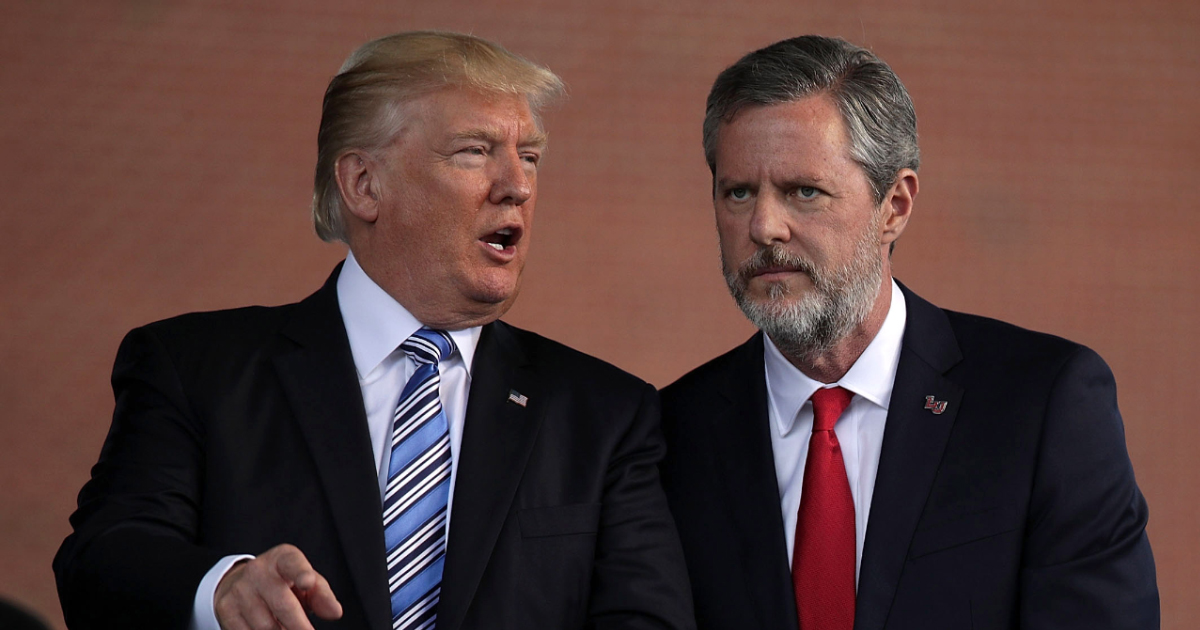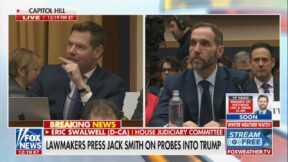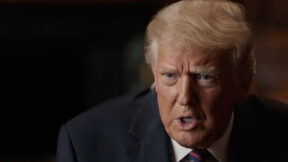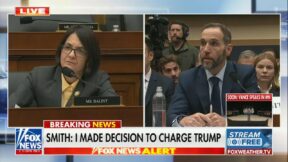Jerry Falwell Jr.’s Obsessive Faith in Trump Robs Liberty University Students of an Education

Donald Trump is not to be criticized. That’s the message that students at Liberty University got from Jerry Falwell Jr. back in 2016. It’s the same message he’s delivered on cable news appearances and in absurd tweets ever since.
First, let’s stipulate for the sticklers that a University newspaper is not the same thing as a regular newspaper. They are learning journalism, but in a controlled environment. Some universities may fully indulge the press freedom of the students, but this it not a legal or constitutional obligation. The school has discretion. Everyone understands that.
However, it doesn’t mean schools are immune to criticism when deserved, and it is richly deserved in the case of Information Czar Falwell, who, as was revealed in an extensive report from Christian publication World Magazine, put an iron thumb on the opinions of the student body in general, and the students of journalism in particular. A thumb both religious and political.
Falwell Jr.’s infatuation with Trump, indeed his fanatic religious devotion to The Donald, is not itself breaking news. Whether it’s because of the scraps of attention Trump has thrown him (about which he’s incessantly bragged) or merely his susceptibility to the paranoid style, Falwell is among the most cultish of all Trump’s devoted, a fact that has been on sad display for over two years, now. But in addition to being gross, his over-developed man-crush is also irresponsible, it seems.
Read this description:
Falwell began reviewing prior to publication Champion articles that mentioned Trump. On one occasion, he made Champion editors end opinion pieces with a note on how they were voting. Opinion writer Jordan Jarrett chose not to and found a note under her published article: “The writer refused to reveal which candidate she is supporting for president.”
And this:
In October 2016, The Washington Post released a 2005 recording of Trump describing advances he’d made on women. Sports editor Joel Schmieg wrote a column for the Champion criticizing Trump’s locker room talk, but Falwell told Schmieg’s editor not to run it. Falwell said the newspaper had one article about Trump that week, so Schmieg’s piece was redundant.
Frustrated, Schmieg posted it on his Facebook page, and Champion graduate assistant Nate Haywood approached Schmieg on behalf of Champion adviser Deborah Huff, warning him not to do anything like that again. Instead, Schmieg resigned: “I didn’t feel comfortable being told what I couldn’t write about by President Falwell.”
The article for World is about more than Trump and the election. It’s broadly about how Falwell handles the paper overall which, again, is a fair subject for criticism even though they have the authority to oversee the paper.
Specifically the article is focused on the progression of oversight, from the initial interference to an eventual “reorganizing,” during which those who had been apparently identified by Falwell as troublemakers were ousted, costing them scholarship money, and others were put in their place, with a mission to be more compliant.
Kirk told the new staffers, “Your job is to keep the LU reputation and the image as it is. … Don’t destroy the image of LU. Pretty simple. OK? Well you might say, ‘Well, that’s not my job, my job is to do journalism. My job is to be First Amendment. My job is to go out and dig and investigate, and I should do anything I want to do because I’m a journalist.’ So let’s get that notion out of your head. OK?”
He added, “It’s their newspaper. They can stop this newspaper today if they wanted to. And just so you know, they can do it. Too much trouble, too many problems, we’re getting ourselves in hot water, you guys are doing stories we can’t defend. We’re gonna stop.”
It’s worth pointing out here that, although the students may not be there to practice unfettered journalism, they are certainly there to learn it, in which case “get that notion out of your head” is pretty radically contrary to the subject of their education. But telling.
The precipitating events were not political, but instead marginally Biblical, largely about image, and involved a protest and then day of prayer by the group Red Letter Christians. To say that the group has theological differences with the evangelicals would be an understatement, and the group’s events were, by directive, not to be covered.
The subsequent chain of events, written about at length here in the excellent report from World Magazine, are a fascinating read.
But it is the Trump episodes that are the most revealing about Falwell Jr.’s character — and stability.
The Trump saga was not a matter of theology or religion, but Jerry Falwell Jr. has treated it with equal if not greater zeal, both at his school’s newspaper and in the press and public off-campus. He has dealt with the politics of Trump religiously, and with more devotion than his actual professed religion.
That is not mere hyperbolic conjecture or characterization. It’s demonstrable.
For example, Falwell Jr. has mentioned Trump more times in Tweets in August than he has mentioned God in the lifetime of his Twitter account. The word “biblical” appears only once, in answer to a question about classes at his school. “Bible” appears twice, once regarding Billy Graham, and once to snark at someone regarding gun control. (Several of his mentions of God were also in troll fights, ie. “for God’s sake.”)
His mentions of Trump, and tweets related to Trump (such as his crusade against Jeff Sessions) could fill a bottomless pit of torment.
The things that his interactions with Liberty’s Champion newspaper reveal about Falwell Jr. are manifold and manifest. Recall that at the same time he quashed a story at the Champion regarding Trump’s lewd remarks on the Access Hollywood tapes, he was also in the press himself decrying their release as a “conspiracy” against the then-candidate.
“We’re never going to have a perfect candidate unless Jesus Christ is on the ballot,” he said at the time.
(By the way, he’s used “Jesus Christ” exactly one time on Twitter. He’s used Jesus or Christ a few more times, but nearly always in reference to Trump or to argue about the government.)
What is revealed is he is a political actor, not religious. A lamentable state of affairs in America is the preoccupation of conservative evangelicals with the political process and their own perceived persecution at the expense, and in some cases in contradiction to, their purported religious beliefs. Jerry Falwell Jr. is the archetype of this character.
It also reveals his bitter anger and small-minded pettiness, though those attributes are also on ample display even without this article about his school’s newspaper.
And most of all, it shows that, given the chance to silence all criticism of Trump — even that from a Christian perspective — given the power and authority to shut down any who speak ill of The Donald, Falwell would. And he did. And so would others like him in the Trump trenches. It is from that mentality, and not merely the established, stipulated mendacity of the press, from which springs their “enemy of the people” fervor.
“Answer a fool according to his folly, lest he be wise in his own conceit.” (Proverbs 26:5)
That verse is doubly applicable here. With regard to Falwell, World Magazine, and those who chose to speak to them for the article, are wisely answering his folly. Lest he think himself right. Would that he, and those like him, had the same wisdom regarding Trump.
[Featured Photo by Alex Wong/Getty Images]
—
Follow Caleb Howe (@CalebHowe) on Twitter
This is an opinion piece. The views expressed in this article are those of just the author.
New: The Mediaite One-Sheet Newsletter
Your daily summary and analysis of what the many, many media newsletters are saying and reporting. Subscribe now!






Comments
↓ Scroll down for comments ↓